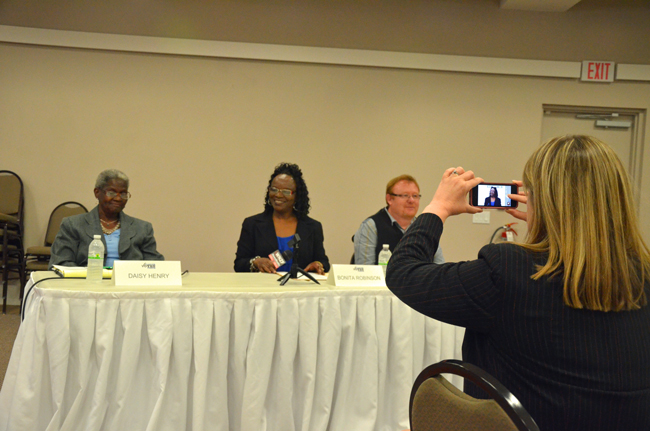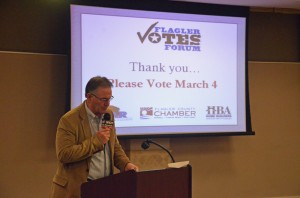
The one and only candidate forum ahead of Bunnell’s city commission election on March 4 took place Tuesday evening—no thanks to anyone in Bunnell: the event was organized by the Flagler County Chamber of Commerce, hosted by the Flagler County Association of Realtors at the Realtors’ building, and moderated by WNZF’s David Ayres.
For reasons explicable only by Bunnell’s affinity for self-inflicted wounds, it took a lot of pleading by the chamber to convince the candidates to attend, and one of the four snubbed the whole thing because he didn’t like the rules. The three who did—incumbent John Rogers, past commissioner Daisy Henry and former Bunnell employee Bonita Robinson—were scheduled for a 90-minute forum, fielding a dozen questions. They got through them in a minute shy of an hour: in contrast with typical candidate forums, these three, particularly the two challengers, often had trouble filling out their allotted time, and in Robinson’s case three times candidly declined to answer the question for not knowing how to.
Few of their answers grappled with actual issues, ideas or solutions, hewing instead to generally positive statements about wanting to do their best or speaking in generalities that would not distinguish them either from each other or from any well-meaning resident of the city they seek to represent. Rogers, displaying the advantage of incumbency—and copious notes, from which he read at times—was in greater command of facts and issues, though he, too, answered many questions with restatements of facts rather than answers.
The forum took place before an audience of about 40 people, which included every member of the Bunnell City Commission, among them Jenny Crain-Brady, who should have been on the candidates’ table had it not been for the errors—the city administration’s and her own—that led to her disqualification on the minor matter of a filing fee.
Rogers, in office since 2011—he won by three votes—is the owner of Johns Towing, the wrecker service, in Bunnell. Robinson—who is no relation to Catherine Robinson, the mayor—worked in the Bunnell Public Works department until September, when she took a job as an in-school suspension monitor with the Flagler County School Board. Though she was critical of the new Bunnell city manager, he was not the reason she left, she said after the forum. “I needed to get into my field of work for my education,” Robinson said, citing the four-year degree she’s soon to receive and her goal of working with children.
Henry served 14 years on the city commission before her defeat last year, when Bill Baxley replaced her by netting four votes more than she did despite Henry driving in many of her own voters—and walking them up to the voting booth unimpeded by election workers. Henry also had help from the late Arthur Jones, the late police chief, who drove in many voters, and the support of ex-City Manager Armando Martinez, who knew that his future in Bunnell hinged on Henry winning reelection. He was right. Martinez was fired by June.
Just as last year’s election was a referendum on Martinez’s future, this year’s election is a referendum on that of Larry Williams. The two top vote-getters in the four-way race are elected. Should Rogers lose his seat and both Henry and Robinson win, power on the commission would revert back to the bloc Mayor Robinson controlled before Baxley’s win. The mayor did not vote to hire Williams or even agree to sign his contract. Her choice was Judi Stetson, the city’s special projects and grant director (who was also in the audience Tuesday evening).
During the forum, only one question addressed the deep divisions on the city commission, and only indirectly, when candidates were asked how they would address the city’s “perception problem” resulting from recent “staff changes.” But the question produced the sharpest retorts from the candidates.
“Being part of that transition, working for the city in the past and moving on to a different organization, I can tell you from the inside some of the things that went wrong with that,” Bonita Robinson said. She was critical of the change in city manager, which she said caused the problems. She did not cite Williams by name, but was critical of his approach.
“If a city manager is looking for a job, we should be looking for a new city manager,” Rogers fired back immediately, referring to Martinez’s well-publicized job hunts, defending the new city manager and saying that with the new police chief and the new finance director on board, Williams had righted the city’s business. Robinson glared at Rogers as he spoke, and Rogers stared right back at her in the testiest segment of the forum.
Henry, too, was critical of the firing of Martinez, saying it had “brought division among staff,” though she acknowledged not being familiar with Williams.
Only one other question elicited sharp and clear positions: on Bunnell’s Police Department. All three candidates like it, all three want to keep it. “I am for the Bunnell Police Department, I’ve always been for the Bunnell Police Department,” Rogers said, mischaracterizing his record somewhat: when he ran three years ago, he was skeptical about Bunnell having its own force, but since his election, he has spoken or voted in favor of keeping it at every turn.
For Robinson, building a relationship between the police department and the community is a central plank. “Part of my duty as commissioner will be to advocate for equality,” she said, including “strengthening the relationship” between neighborhoods and the department. Henry said Bunnell police has always had a good relationship with the Sheriff’s Office and will continue to do so.
Asked about code enforcement in the city being “reactive” rather than “pro-active,” Henry and Robinson were supportive of the department, though Robinson said code enforcement could be a used “to bring in revenue, I mean not to run businesses out, but to go by enforcement code and bring revenue in for the city.” Rogers had no problem with a reactive department. “We are reactive. If somebody calls with a complaint we will send our community ambassador out, and we call it an ambassador because he is there to provide a bridge between the citizens and the commission,” he said. But Bunnell is not intending to be pro-active, because it doesn’t want to be heavy-handed like Palm Coast, he said to chuckles from the audience. “It’s a win-win situation being reactive rather than proactive.”
A question about how to handle the old courthouse, a wreck of a property the city just acquired from the county, drew varied but non-committal answers. Henry sees the city moving in “and through our grant writer,” she said, “I believe we had gotten some grant funding to restore that side I believe when it was up in the air.” (In fact, the city secured a loan from a local bank to accomplish some of the restoration, but not enough to account for all the building’s needs.) Robinson, too, said grants could cover the costs (an extremely unlikely possibility).
“I would like to see the numbers,” Rogers, who voted against acquiring the courthouse in November, said. The city would house 20 employees and 15 cops in the building, but he is skeptical about the city’s ability to afford both renovation and upkeep of the old building, “because the citizens of Bunnell are going to have to pay for it, in reality.” He added: “I don’t want to burden the taxpayers and bite off more than we can chew.”

The candidates were hazy on their top three economic development priorities as neither Henry nor Robinson could cite so much as two. Rogers said he would support making incentives available, though he did not specify what kind, and noted that the commission had approved a moratorium on development impact fees, which he would extend. On the homeless, Henry, Rogers and Robinson all agreed that the community bears a responsibility to address the problem, but Robinson said government has little role (“it’s limited what the city organization can do, it’s more of a community problem”) while Henry and Rogers said that government should play a role. As to what role, Rogers said: “I don’t have the answer to that.”
Robinson could not answer questions about Bunnell government’s role with agriculture, about the seven charter amendments on the March ballot or about the city’s financial reserve. But while Henry and Rogers gave those questions a shot, they were not much more enlightening, except on the matter of the amendments: Henry served on the charter review committee, and said, like Rogers, that all seven amendments were important.
Randall Morris, who also served on the charter review committee, is the fourth candidate and the no-show on Tuesday. He objected to the format, to not having a say about the moderator, to the fact that no questions would be taken from the audience, and even to the moderator’s authority to eject a participant if he or she became disruptive something that has never happened at any forum in Flagler County, and that has never come close to happening in forums moderated by the eminently amiable and non-confrontational David Ayres.
“While we appreciate your comments and feedback,” Lea Stokes, who chairs the Flagler Votes forums for the chamber, wrote Morris on Feb. 6, “we are not inclined to modify policies or the format for the forum, particularly since they have proved successful in the past.”
Morris also sought to “review” the questions before they were asked—a demand unheard of in any serious political forum.
![]()
Bunnell City Commission Candidate Forum, Feb. 18, 2014





























Charles Gardner says
Much ado about almost nothing. I thought some of the questions were bogus and misleading. It was pretty clear that John Rogers had a better handle on the issues that face the city. I do have several comments but short on time this morning. I will have more later today.
Will says
Bogus and misleading questions? Would you care to elaborate? I thought individually and collectively that they were a roadmap for thoughtful consideration of Bunnell’s future.
Rollins says
What a JOKE !!!!!
Mike says
How can such a small City have so much drama?
Will says
The citizens and voters of Bunnell have a right to expect that their elected officials, and those who want to be elected, have a grasp of issues which affect the city, as well as those issues which they should address.
It’s not a joke to consider those issues, and it’s not “drama” for candidates to answer public questions.
Candidate forums like these benefit the public in several ways, and two are most important: 1) Voters get to know which candidates are up to speed on issues, and 2) Candidates get to learn what issues are on the minds of the community.
A refreshing note came from candidate Bonita Robinson too. If an issue was new to her, she was honest with the group, as Pierre said above, and stated that since she didn’t know about it, she would have to pass on the answer. Isn’t that a rare quality instead of political spin? Good for her!